www.aljazeerah.info
News, December 2012
Archives
Mission & Name
Conflict Terminology
Editorials
Gaza Holocaust
Gulf War
Isdood
Islam
News
News Photos
Opinion Editorials
US Foreign Policy (Dr. El-Najjar's Articles)
www.aljazeerah.info
|
Editorial Note: The following news reports are summaries from original sources. They may also include corrections of Arabic names and political terminology. Comments are in parentheses. |
Egyptians Vote on the Proposed Constitution
December 15, 2012
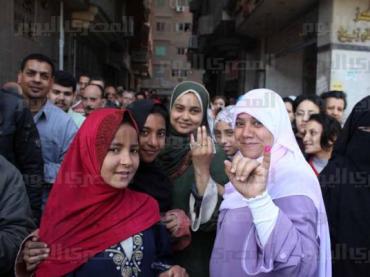 |
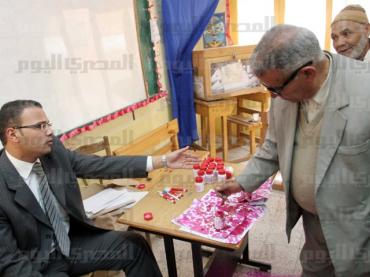 |
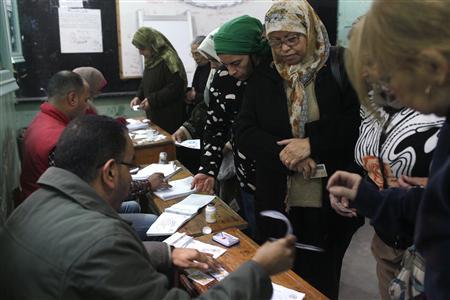 |
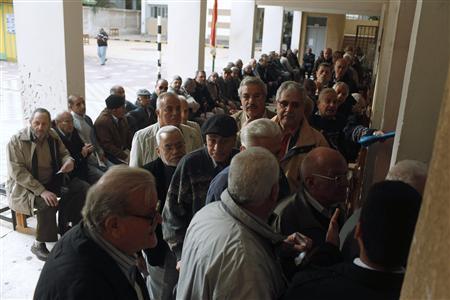 |
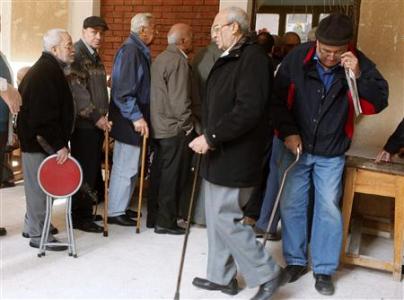 |
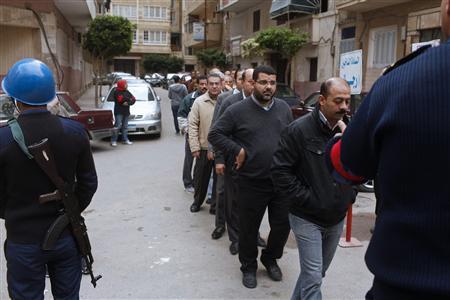 |
Egyptians vote on divisive constitution
By Tamim Elyan and Marwa Awad
Sat Dec 15, 2012 9:28am EST
CAIRO/ALEXANDRIA (Reuters) -
Egyptians queued to vote on Saturday on a constitution promoted by its Islamist backers as the way out of a prolonged political crisis and rejected by opponents as a recipe for further divisions in the Arab world's biggest nation.
Soldiers joined police to secure the referendum after deadly protests during the buildup. Street brawls erupted again on Friday in Alexandria, Egypt's second city, but voting proceeded quietly there, with no reports of violence elsewhere.
President Mohamed Mursi provoked angry demonstrations when he issued a decree last month expanding his powers and then fast-tracked the draft constitution through an assembly dominated by his Muslim Brotherhood group and its allies. At least eight people were killed in clashes last week outside the presidential palace.
The liberal, secular and Christian opposition says the constitution is too Islamist and tramples on minority rights. Mursi's supporters say the charter is needed if progress is to be made towards democracy nearly two years after the fall of military-backed strongman Hosni Mubarak.
"The sheikhs (preachers) told us to say 'yes' and I have read the constitution and I liked it," said Adel Imam, a 53-year-old queuing to vote in a Cairo suburb. "The president's authorities are less than before. He can't be a dictator."
Opposition politician and Nobel Peace Prize laureate Mohamed ElBaradei wrote on Twitter: "Adoption of (a) divisive draft constitution that violates universal values and freedoms is a sure way to institutionalize instability and turmoil."
Official results will not be announced until after a second round of voting next Saturday. But partial results and unofficial tallies are likely to emerge soon after the first round, giving an idea of the overall trend.
In order to pass, the constitution must be approved by more than 50 percent of voters who cast ballots. A little more than half of Egypt's electorate of 51 million are eligible to vote in the first round in Cairo and other cities.
TRANSITION
Christians, making up about 10 percent of Egypt's 83 million people and who have long grumbled of discrimination, were among those waiting at a polling station in Alexandria to oppose the basic law. They fear Islamists, long repressed by Mubarak, will restrict social and other freedoms.
"I voted 'no' to the constitution out of patriotic duty," Michael Nour, a 45-year-old Christian teacher in Alexandria. "The constitution does not represent all Egyptians," he said.
Islamists are counting on their disciplined ranks of supporters and the many Egyptians who may fall into line in a desperate bid to end turmoil that has hammered the economy and sent Egypt's pound to eight-year lows against the dollar.
"I voted 'yes' for stability," said shopkeeper Ahmed Abou Rabu, 39. "I cannot say all the articles of the constitution are perfect but I am voting for a way forward. I don't want Egyptians to go in circles, for ever lost in this transition."
Mursi was among the early voters after polls opened at 8 a.m. (1:00 a.m. Eastern Time). He was shown on television casting his ballot shielded by a screen and then dipping his finger in ink - a measure to prevent people voting twice.
One senior official in the committee overseeing the referendum said Saturday's vote could extend to Sunday if crowds were too heavy to allow everyone cast ballots in one day. Voting for Egyptians abroad that began on Wednesday has been extended to Monday, the state news agency reported.
After weeks of turbulence, there has been limited public campaigning. Opposition politicians and parties, beaten in two elections since Mubarak's overthrow, only announced on Wednesday they backed a "no" vote instead of a boycott.
Flag-waving Islamists gathered peacefully at one of the main mosques on Friday, some shouting "Islam, Islam" and "We've come here to say 'yes' to the constitution".
PALACE SIT-IN
Opposition supporters assembled outside the presidential palace, where there has been a sit-in for days. The walls of the palace, ringed by tanks, are scrawled with anti-Mursi graffiti.
The referendum will be held on two days covering different regions, with the second round on December 22, because there are not enough judges willing to monitor all polling stations after some in the judiciary said they would boycott the vote.
Egyptians are being asked to accept or reject a constitution that must be in place before a parliamentary election can be held next year to replace an Islamist-led parliament dissolved this year. Many hope this will lead Egypt towards stability.
If the constitution is voted down, a new assembly will have to be formed to draft a revised version, a process that could take up to nine months.
The army has deployed about 120,000 troops and 6,000 tanks and armored vehicles to protect polling stations and other government buildings. While the military backed Mubarak and his predecessors, it has not intervened in the present crisis.
(Writing by Edmund Blair and Giles Elgood; Editing by Andrew Heavens)
Update: Shura Council speaker casts ballot, praises turnout
Egypt Independent
Sat, 15/12/2012 - 15:30Voting has started on Saturday morning for the referendum on the constitution draft in 10 governorates. The voting is set to take place in two phases, today and on 22 December. The voting today is taking place in Cairo, Alexandria, Daqahlia, Gharbiya, Sharqiya, Assiut, Sohag, Aswan, North Sinai and South Sinai. Around 51 million voters are registered to cast their ballots in both phases. The voting is taking place in 351 general polling stations and 13,099 sub stations nationwide. Different statements from the Supreme Judicial Elections Commission say that there are between 7,000 and 10,000 judges supervising the polling. The statements follow various courts’ general assemblies deciding to boycott the poll to object President Mohamed Morsy’s infringement on the judiciary when he issued a declaration last month immunizing his decrees from judicial oversight, as well as the Constituent Assembly drafting the constitution. While the declaration was later rescinded, the constitutional draft was salvaged from a possible court dissolution of the assembly as it was submitted before Morsy backed off. The voting is taking place in the midst of rising polarization between Islamist forces and their opponents who say that the draft solely reflects the vision of the ruling Muslim Brotherhood and the Salafi movement. This is the fifth election Egyptians have seen since the 25 January revolution, the first being the referendum on the March 2011 Constitutional Declaration, then the People's Assembly elections in November and December 2011, the Shura Council elections in January and February 2012 and the presidential election in May and June 2012. Egypt Independent provides live updates throughout the day.
3:30 pm: In Gharbiya Govenorate, violent clashes broke out between supporters and opponents of the constitution in front of three polling stations, but no injuries or arrests were reported.
A security source said a violent confrontation took place in front of a polling station in the Meet Hashem village of the Samanoud District.
There were also clashes between Muslim Brotherhood members and members of the Popular Current at a polling station in Mahalla.
Another polling station in Qotour city was the scene of an altercation between members of the Brotherhood's Freedom and Justice Party and members of the former ruling National Democratic Party.
3:00 pm: In Sharqiya, Shura Council speaker Ahmed Fahmy stood in the queue for around an hour until he voted at a polling station. Sharqiya, which is President Mohamed Morsy's hometown, has been home to violent between his supporters and their opponents last week. Fahmy tells Egypt Independent, “We are delighted with this significant participation of Egyptians, both those who will say 'yes' or 'no.'” He described the referendum as a “democratic festival,” adding that it is “the product of the blessed [25] January revolution, which heightened the awareness of the Egyptian people and urged them to participate in crafting their future.”
Meanwhile, the Delta governorate was also home to many no-voters. Ibrahim Badr, a member of the Egyptian Movement for Change, held a banner that read: “The Brotherhood are liars ... Glory to the martyrs.” He questioned the legitimacy of the snap referendum on the constitution. Bader voted "no" and explained his banner by saying that the Muslim Brotherhood did not keep their promises to form a Constituent Assembly with more consensus. He also accused the group of lying to political forces and failing to live up to any of their promises. “If the result is yes, our reaction will be based on thepercentage. If it is a large [margin], we will accept it, but if it is close to the rate of those rejecting, we will not recognize a constitution that does not enjoy popular consensus and will seek to topple it.”
2:30 pm: Samir Abul Maty, head of the High Elections Commission, urged judges to place their identification cards in a place where voters could easily see them, in order to avoid suspicion over the supervision of the referendum. Tension ran high at a polling station in New Cairo after voters insisted on seeing the IDs of judges at the polling station. However, Hesham Raouf, deputy justice minister, said that voters should not ask judges for their identity card, as this represents "disrespect for him as a public employee as he performs his duties," the state-run Al-Ahram reported.
At a polling station in New Cairo, Councilor Rania Galal, the head of the general polling station, said that by 12 pm 600 out of a total of 5900 eligible citizens had voted. Galal said citizens are highly skeptical of the identities of the judges supervising the voting stations, due to rumors that were flying before the referendum. Councilor Kamel Atef, overseeing another polling station, said 500 people had cast their ballots, adding that the judges who agreed to supervise the referendum did so out of a sense of obligation to “protect the country.”
Meanwhile, Zaghloul al-Balshy, secretary general of the commission, called on the operations rooms of the National Salvation Front and other groups to report any violations observed by their monitors. He added that polling stations opened on time with the exception of a few due to certain circumstances out of their control, such as traffic problems, and delays averaged half an hour to one hour. As of 1 pm, the commission had not received reports of violations pertaining to campaigning outside of polling stations. One polling station was closed after an attempt to storm it, according to Raouf.
2:00 pm: In Cairo's Dar al-Salam district, the situation was calm and the lines were long. Many of those standing in line at one of the polling stations were middle-aged or older, engaging in heated debates.
One man walking by yelled that the “Brotherhood have already ruined things,” to which those around him responded, “Keep it to yourself,” and “Everyone came here today with their mind already made up.”
Of the voters saying no to the constitution interviewed by Egypt Independent, many cited the vagueness of the articles and their reliance on "the law." They also said it does little to limit the president’s powers, and was drawn up by a mainly Islamist Constituent Assembly, leaving much of the Egyptian population, including Copts and women, unrepresented.
Some of the no votes were also a rejection of the president and the rushed process by which the draft constitution was written, as well as the snap referendum.
Optometrist Hatem Abdallah, 52, says the past two months proved to him that "[Morsy] is not interested in being a president for [all] Egyptians ... why should I give him more power if so far he's only been using it against me?"
At the Worker's University in Nasr City, Ibrahim Helmy, 67, says, "Call me feloul, call me an infidel, I don't care. It's unfathomable to think of Egypt going down the path that [Morsy] wants to take it down."
He adds, "Who's really in charge of Egypt. Is it Morsy? Is it the supreme guide, or [Khairat] Shater? Nobody tells us anything, we just get decrees and laws and referendums."
In the Upper Egyptian city of Assiut, many of the no voters said they reject the regime as a whole and not just the constitution, in light of the recent political and social polarization.
A high percentage of Christians in the city are voting "no" because of the domination of Islamist forces over the political process.
"The country is falling apart. I am not satisfied with the whole regime," says a doctor who preferred not to mention his name, after casting a "no" vote.
Back in Cairo's Manial district, accountant Kamal Mahmoud, 34, voted no because he is unconvinced on the constitution, criticizing the draft for leaving numerous matters to be decided by the law.
Iman Hassan, 58, an Al-Azhar English teacher, also voted "no" because she is unimpressed with the provisions on women's rights and its "lack of concern with tourism,” a vital revenue earner for the economy.
Moheb Tareq, a 20-year-old student, described the constitution as the Muslim Brotherhood’s, with no representation for other segments of Egyptian society
In Abdeen, Akram Naguib opposed the constitution because it does not limit the powers of the president, but he fears the majority may vote "yes." The draft constitution is “loose and can be interpreted in many ways," he adds.
1:45 pm: Outside of Cairo, Egypt Independent witnessed a high turnout in Mansoura, Daqahlia Governorate, at most polling stations, where more men than women could be spotted. Some verbal altercations took place between voters when lines grew longer and messier. In one polling station, only five employees were managing the process, slowing down voting, while outside, protesters became angry and clashed with military personnel securing the polling station, which led to its temporary closure.
In the Mit Fares village outside of Mansoura, a teacher was spotted directing people to vote "yes" outside the only polling station there. “I am voting ‘no’ because Egypt deserves better,” said Salwa Gamal, a student at Mansoura University.
1:30 pm: Deputy Muslim Brotherhood Supreme Guide Khairat al-Shater went to cast his ballot in a polling station in Nasr City, with a clique of his followers in tow. The monitoring collective Shayfeencom reported that Shater did not stand in line. Upon his arrival, opposition voters chanted slogans against him and the Brotherhood, such as “Down with the rule of the supreme guide,” Al-Masry Al-Youm reported.
More than one source, including the National Salvation Front's operations room and the Egyptian Social Democratic Party operations room, reported that Copts were prevented from entering certain polling stations in Nasr City.
1:00 pm: Despite being the site of violent clashes yesterday, a high turnout was witnessed by Egypt Independent in the Ramla district of Alexandria. Clashes had erupted Friday between Morsy supporters and opponents, with the latter besieging Al-Qaed Ibrahim Mosque after alleging that Morsy supporters who attacked them were hiding in there.
Mohamed Hussein, 47, a Salafi, says he will vote "yes" in order to pass this constitution and establish an Islamic state; although he believes that Sharia will not be implemented thoroughly through Articles 2 and 219, he thinks the current document could be a milestone for the future.
Nasser Mohamed, 34, who doesn’t describe himself as an Islamist, will also vote "yes" to protest Morsy opponents besieging the mosque yesterday.
Meanwhile, presidential spokesperson Yasser Ali said in an exclusive statement to CNN Arabic that President Mohamed Morsy voted in the first phase of the draft constitution referendum in his constituency at a Heliopolis School. Ali denied the claim of "some opponents" that he voted outside his district, in violation of the law.
Ali explained that Morsy changed his place of residence on his national ID card after he was elected president so that Heliopolis would be his constituency, instead of Zagazig, where he cast his ballot in the presidential election and the runoff.
Morsy voted in the same constituency where former President Hosni Mubarak voted, but in another school.
Morsy cast his referendum ballot at the Heliopolis Middle School for Boys, which is located near Merryland Park, close to Heliopolis Middle School for Girls where Mubarak and his family used to vote.
12:45 pm: Many of those interviewed by Egypt Independent who are planning to vote "yes" on the constitution say they are doing so for the sake of stability.
In the working class district of Dar al-Salam, 47-year-old Mohamed Basheer, the owner of a satellite television appliance store, says, "There are people saying 'no' to this constitution because they are confused, and others because they're benefiting from the way the country is now, on the verge of ruin. The constitution is a step toward stability, and some people are fighting that." He adds that some opposition figures are "desperate now because they feel like they have a chance to topple the Brotherhood regime. This is politics. There's always people who want to be in power." Basheer feels Morsy "hasn't had a fair chance."
Galal Fahmy, 61, is casting a "yes" vote because he wants "the country to freshen up." He complains that since the revolution, business in his electronic parts shop has been dead. "I'm voting 'yes' so that the country moves forward," Fahmy says, adding that the "no" vote campaigners have been misleading people with untrue accounts about the constitution.
In Abdeen, Ahmed al-Shazly is also voting "yes" because he seeks stability. "I read the constitution, and so did my daughter in high school," he says, adding that there wasn't much contention. He concludes that the articles causing disagreement can be discussed later in Parliament.
12:30 pm: In the first signs of clear campaigning, a number of Muslim Brotherhood supporters were witnessed in the vicinity of polling stations in the middle class areas of Hadayek al-Kobba, Wayly and Al-Zawya al-Hamra, distributing flyers to promote voting "yes" on the constitution, in addition to stickers labeled "Know your Constitution," amid limited turnout by voters, Al-Masry Al-Youm reported.
The Brotherhood provided minibuses to take voters to their polling stations for free. One of the voters tells Al-Masry Al-Youm that "members of the group transport voters to polling stations whether they support or reject the constitution, but they hand them flyers [supporting] it."
Meanwhile, the National Salvation Front's operation room reported that a judge was directing voters to vote "yes" on their ballots in a polling station in Hadayek al-Kobba. The front was formed following mass protests against Morsy over the last few weeks and includes several opposition figures.
Morsy had voted in Heliopolis earlier in the morning, but there are some concerns about his ballot's legality because he hails from Sharqiya Governorate, where mass protests against him took place last week. His son, Osama Morsy, denied rumors that the president changed his address so as not to vote in Sharqiya and avoid his opposition there. Osama said that Morsy's work address is in Heliopolis, which is where the Ettehadiya Palace is located, and using a work address is an option when voters register their information.
Morsy's family voted today in Sharqiya, including his wife, Nagla Ali Mahmoud, and daughter Shaimaa, as well as Osama, who waited in a long queue for their turn. High security was seen in the area surrounding Morsy’s house in Zagazig. The operations room of the Army and security forces was set up in a stadium facing the house. Security sources told Al-Masry Al-Youm that the security measures were not taken to only secure Morsy’s house, but the whole city.
12:00 pm: Strong female participation was observed by Egypt Independent in different polling stations in Cairo. In a polling station in Abdeen, close to downtown, Fatemah Moussalem had just cast a "no" vote on her ballot, saying that she read some of the articles of the constitution draft and felt that those who wrote them didn't really represent the Egyptian people at large. "It only represents them," she says. For her, the draft is meant to ensure the the Muslim Brotherhood's grip on power, from which President Mohamed Morsy hails. "I am hopeful, and the people who overthrew [former President Hosni] Mubarak can also say no to the constitution," she adds.
In the same polling station, Faten came with her husband with the intention to also vote "no," "because the constitution is unfair," she says. While she wanted to boycott the voting, her husband convinced her to come for fear that lack of participation would encourage vote rigging.
In the middle-class district of Manial, a long line of women queued ahead of a polling station. Samar, a veiled woman in her 30s, emerged from the polling station declaring that she had "carried out her patriotic duty." She had voted no, she says, because the constitution "doesn't represent us." She was particularly concerned about the draft's provision on healthcare.
11:30 am: Sami Anan, the former Chief of Staff of the Egyptian Armed Forces, cast his ballot for the first time in his life, the website of privately-owned Al-Shorouk newspaper reported. The paper quoted a source close to the former general as saying that Anan voted in the polling station of Fatma Helal School in the upscale neighborhood of Tagamoa al-Khamis. As a member of the military, Anan could not vote in previous elections. However, President Mohamed Morsy made some critical reshuffles in the Supreme Council of the Armed Forces in August, sending both Anan and Field Marshal Hussein Tantawi to retirement, and appointing the younger Sidqy Sobhy and Abdel Fattah al-Sisi, respectively, in their places.
11:00 am: There have been delays in polling stations opening in Cairo and outside, mainly due to judges arriving late or not showing up. Cairo Governor Osama Kamal tells Al-Masry Al-Youm that about 10 polling stations in Cairo did not open on time because judges arrived late. According to him, Cairo is divided into four voting areas, three of which are already functioning properly, but the fourth is delayed and is due to operate shortly. He adds that if the judges continue not to show up, the Supreme Judicial Elections Commission would be informed to find an alternative.
In the Bassatein area, south of Cairo, polling stations were also late to open. A security source tells Al-Masry Al-Youm that the problem is that the stations are hard to reach by public transportation, especially for employees manning the polling process. Similar delays were also experienced in Tanta and Zefta in Gharbiya, and Sohag. According to Al-Masry Al-Youm, 160 polling stations in Sohag opened late.
Most Assiut polling stations opened at 8 am on Saturday except some in Badary, Dayrout, Qousseya and Sadfa due to a shortage of employees supervising the process and women who were supposed to check identity of voters wearing face veils.
10:30 am: In a first sign of violence, a man fired live ammunition in the air in front of a polling station in the city of Mahalla, Gharbiya, Al-Masry Al-Youm reports. Hatem Osman, the security head of Gharbiya, told Al-Masry Al-Youm, that the man was arrested and that it is an individual case. Gharbiya has a little less than 3 million voters. Mahalla, which is the traditional site of labor unrest, has seen mass protests against the Brotherhood last week, after which the city declared itself an autonomous zone from the rule of Morsy, as a symbolic gesture. Most polling stations in and around the city have already witnessed a high voter turnout.
10:00 am: Coptic Pope Tawadros II cast his ballot in a polling station in the Abbasseya area alongside other Christian preachers, Al-Masry Al-Youm reported. As he voted, the pope called on all Egyptians to participate in the elections whatever their position is towards the constitution. He added that there is enough freedom for everyone to express their opinions and to perform their national duty. In the recent rift between Islamist forces and their opponents over the constitution, some Islamist leaders accused Christians of being behind the polarization. Official records say Christians make up some 10 percent of the population.
9:30 am: In the city of Assiut, long queues have been spotted by Egypt Independent in different polling stations. A low-ranking military officer is placed inside every station. In one polling station, many of the voters are middle class professionals, leaning toward casting a "no" vote. "I say a thousand 'no's to the chaos we're living in and to the constitution," says government employee Moqbel Azmy as he exits the station. Many expressed concerns that the Muslim Brotherhood will mobilize people in the countryside of the governorate to cast a "yes" vote, since they want to see this constitution implemented. In another polling station, a high turnout of Christians is observed, as noted by the names called out during voting. Many at the station say that the long queues are caused by the fact that the polling station used to have three sub-stations, but was turned into one due to the shortage in supervising judges.
9:00 am: Morsy voted in a polling station in Heliopolis, east of Cairo, state television reports. The school was handed over to members of security and intelligence ahead of the president's arrival and a red carpet was put at its entrance, according to the Turkish Anadolu news agency. After voting, the president made sure the process is moving forward smoothly. Surrounding voters chanted and applauded for him.
Morsy called for the referendum on 1 December, the day he received the constitution draft from the Constituent Assembly, and set the 15 December date as stipulated by the March 2011 Constitutional Declaration.
8:30 am: Long queues of voters are witnessed by Egypt Independent in different polling stations in Heliopolis. Army and police personnel are guarding the polling stations and organizing voters' queues. In one polling station, with five sub-stations, only one judge is overseeing the process. The Supreme Judicial Elections Commission gave different statements on the number of judges officially participating in the supervision of the polling, following the decision of many judges and courts' general assemblies to boycott the polling. In the queue, one female voter who wants to stay anonymous says that she is there to nullify her vote. "I am lost and stopped being able to understand anything. Everyone around me is saying the constitution is bad, but then what will happen if it fails?" she says, explaining that she also nullified her ballot during the presidential run-off between President Mohamed Morsy and Mubarak's last prime minister, Ahmad Shafiq, because neither of them represented her. "I had to convince her to come at least and nullify her ballot," interjects her angry, veiled mother. "You never know. They could falsify her ballot. Those in power can do anything," she adds, asserting that her ballot will be marked with "a 'no' vote, once, twice and thrice to make sure that I am against this constitution."
Alexandria sees changing landscape of Islamist groups
Sat, 15/12/2012 - 00:55
ALEXANDRIA — Many of the protest scenes that played out over the past weeks are emblematic of substantive changes in the landscape of Islamist movements, particularly in Alexandria, according to observers.
Fair Use Notice
This site contains copyrighted material the
use of which has not always been specifically authorized by the copyright
owner. We are making such material available in our efforts to advance
understanding of environmental, political, human rights, economic,
democracy, scientific, and social justice issues, etc. We believe this
constitutes a 'fair use' of any such copyrighted material as provided for
in section 107 of the US Copyright Law. In accordance with Title 17 U.S.C.
Section 107, the material on this site is
distributed without profit to those
who have expressed a prior interest in receiving the included information
for research and educational purposes. For more information go to: http://www.law.cornell.edu/uscode/17/107.shtml.
If you wish to use copyrighted material from this site for purposes of
your own that go beyond 'fair use', you must obtain permission from the
copyright owner.
|
|
|
|
||
|
||||||


